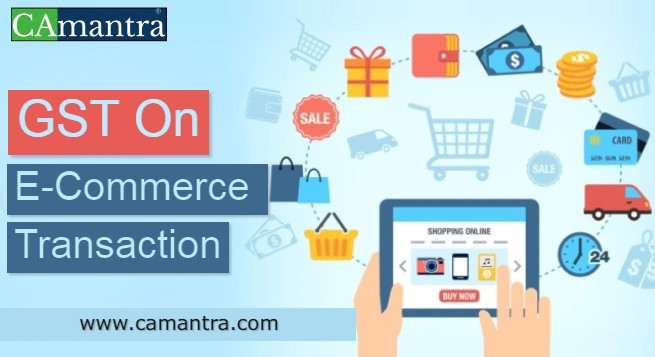In this digital era, day by day e-commerce transaction is increasing rapidly in the view of this even government introduced some new provisions through GST which was not there before the execution of GST laws, E-commerce transactions look a bit complicated because many transactions are happening simultaneously. In e-commerce transactions, the supplier of goods and services may or may not have a permanent office in a taxable territory in which he/she supplies goods and services. Finance Act 2020 also brought some changes in the taxability of e-commerce transactions from income tax perspective.
E-commerce also popular as Electronic commerce which simply means supply of goods and services through electronic mode over the internet moreover, in legal term Electronic Commerce has been defined in CGST Act, 2017- section 2(44) to cover the supply of goods /services or both, including digital products over digital network.
We will discuss the applicability of GST on the aggregator model of the e-commerce where there is involvement of operator or aggregator in this emerging model two separate and distinct transaction were involved to execute the sale:
- Supplying goods or services by supplier to their consumers
- The ECO(e-commerce operator) supplying services to the supplier for using their platform
Before going further we would like to elaborate one of the specific provisions of GST Act, 2017 which particularly apply in cases where specific services provided through ECO.
CGST Act, 2017- Section 9(5) which deals with the chargeability of some aspects of e-commerce transactions according to this section government through notification specify categories of services specify the tax on which shall be paid by the e-commerce operator if such services are supplied through it, and all the provisions of this act will apply to such e-commerce operator as if he/she is the supplier liable for paying the tax in relation to the supply of such services.
Note: The above provisions are applicable on interstate supply as well as per similar provision of section 5(5) of the IGST Act, 2017 shall mutatis-mutandis apply on the e-commerce operators.
Note: Three services, namely
- Motor Cab
- Hotels and accommodation* and
- Housekeeping* services have been notified under the CGST Act, 2017- Section 9(5).
NOTE- if a person dealing in these service and liable for registration under the CGST Act,2017- section 22(1) then this notification will not apply to them.
Now, we will proceed further for technical and legal aspects of these types of transactions.
Registration Under the GST Act, 2017
Under the Central Goods and Service Tax Act, 2017- Section 24 (ix), every person supplying goods or services through electronic commerce operators is required to be mandatorily registered, without any threshold exemption limit.
However, the Government has power to exempt specified suppliers from registration and moreover, Vide Notification No. 65/2017-C.T., dated 15-11-2017; the Central Government, exempted persons making supplies of services, other than supplies specified under sub-section (5) of section 9 of the said Act through ECO (e-commerce operator) and having an aggregate turnover, to be computed on the basis of all India, not exceeding an amount of INR 20 lacs in a financial year.
Note: CGST ACT, 2017- Section 9(5), refers to some services where e-commerce operators are liable to pay GST instead of suppliers.
Hence, final position after notification is, If a person supplying services other than those mentioned in Section 9(5) of the CGST Act are required to register and collect GST only if his/her turnover is more than the threshold limit and for those service providers who were covered under section 9(5) were not liable to be registered under GST, as liability to pay GST is on the ECO (e-commerce operator) and if a person supplying goods through e-commerce operator is compulsorily required to get themselves registered under GST irrespective of turnover.
In Addition, According to the CGST Act, 2017- Section 24(x) the advantage of threshold exemption is not available to ECO and they are liable to be registered irrespective of the value of supply made by them.
Who Is Liable To Pay GST?
In General, the liability to pay GST is on the supplier of goods/ services but in the case where the supply is executed through ECO then some specific provisions also apply along with the normal provisions unless and until contrary with the specific provisions.
In case of services notified under the CGST Act, 2017 Section 9(5), provided through e-commerce operator then in that case e-commerce operator is liable as if he is a supplier of the service even if payment is not directly received by the ECO.
In rest of the cases goods or services suppliers as the case may be liable to pay the GST on such supply.
Liability in case where Commission Charged from Suppliers by the ECO then, supplier i.e. operator is liable for GST and normal provision will apply in this specific case, supplier will issue invoice to the receiver for using its service and shall levy GST on such supply.
Tax Collection at Source:
This is the one of the most important provision of the GST which is specifically for the e-commerce transactions under the CGST Act, 2017- Section 52 deals with the TCS (Tax Collected at Source) provisions according to this section every e-commerce operator will deduct 1% TCS before making payment to the supplier or vendor and such value shall be computed on the net value* of taxable supplies.
*The meaning of “net value of taxable supplies” that the aggregate value of taxable supplies of goods or services or both, other than the services on which entire tax is payable by the ECO, made during any month by all registered persons by such operator reduced via the aggregate value of taxable supplies returned to the suppliers during the said month.
Tax Collected at Source deducted is reflected in the electronic cash ledger of the supplier. However, the Government has clarified that Tax Collected at Source shall be deducted only when the supplier is liable to pay GST thus; TCS is not required to be collected on exempt supplies. For the purposes of TCS, ECO need to get a separate registration for TCS, irrespective of the fact that it is already registered under GST as a supplier or otherwise and has GSTIN.

